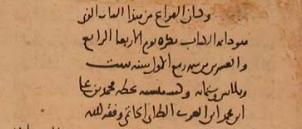
Ibn ʿArabi's influence has been far-reaching, in ways that are both obvious and not so evident. Having synthesised previously oral teachings, he provided a coherent and profound language for all future discussions of spiritual teaching.
What distinguishes him, above all, is the quality and quantity of his writings. He (and his close disciples) laid great emphasis on the written word as an expression of direct inspiration and as a mode of being. He was not simply writing about mysticism – his very mode of expression itself has a deep effect upon the alert reader.
The process of establishing this written legacy was well underway in his own lifetime, with his works being scrupulously copied and checked in his presence before being gradually disseminated to a wider audience.
According to his own testimony, Ibn ʿArabi wrote over 300 distinct works, ranging from the enormous al-Futūḥāt al-Makkiyya, which fills thousands of pages of Arabic, to innumerable small treatises which are no more than a few pages long. At least a third of these are in manuscript form surviving to the present day, and copies can be found in libraries throughout the Islamic world, especially Turkey (due to the importance given to the akbarian tradition by the political and religious elites from the time of the Seljuks). One of the largest digital collections today is held by the Muhyiddin Ibn 'Arabi Society.
Every other writer acts according to the dictates of their own choice or free-will, or according to the knowledge which is being promulgated. He puts in what he wants and leaves out what he wants; or he puts in what this knowledge gives him, once the question under consideration has become clear to him.
We, on the other hand, write in the following fashion: the heart clings devotedly to the door of the Divine Presence, watchful for what unfolds when the door is opened, in poverty and need, empty of all knowledge. Whatever comes to it from behind that curtain, the heart hastens to obey and sets it down according to the measure appointed in the divine command.